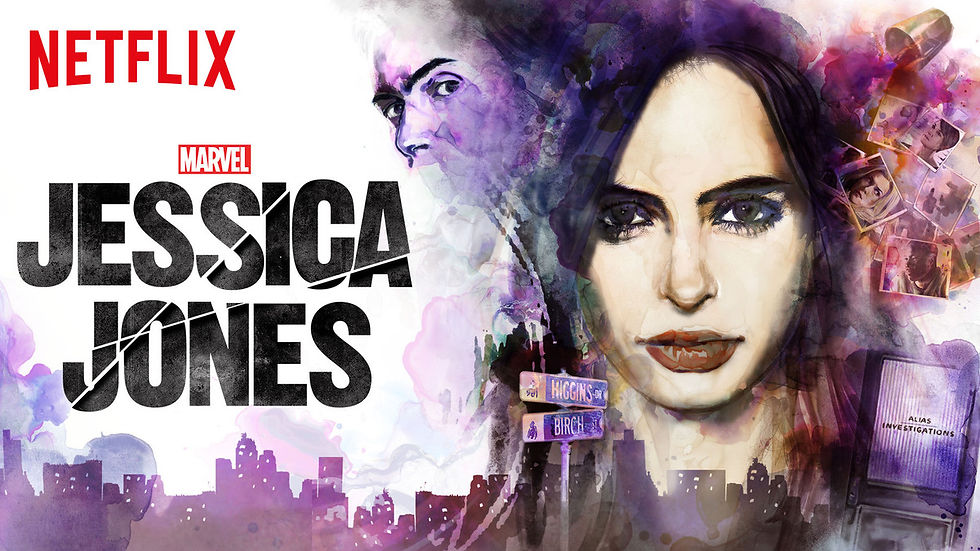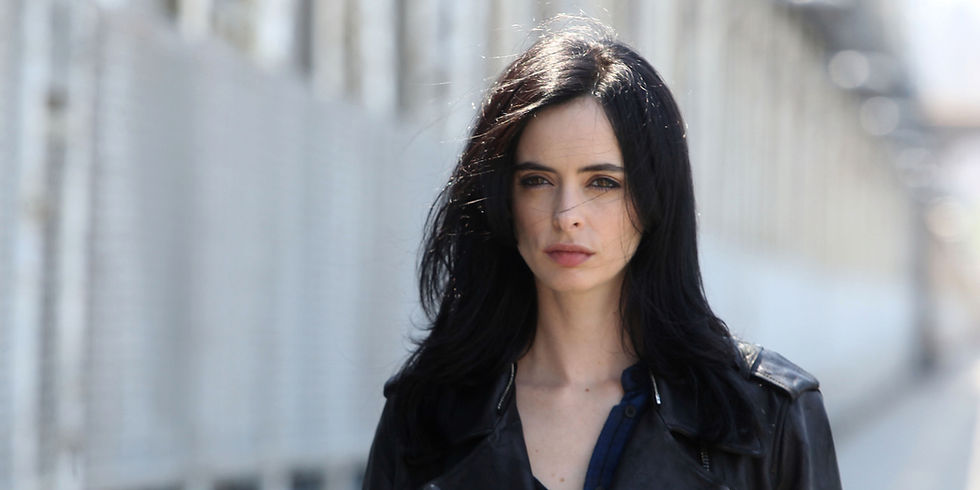Jessica Jones
- Laura Slinger

- Dec 13, 2017
- 7 min read

We’ve had some especially strong comic book TV shows debut recently, including the incredibly fun feeling of The Flash and the gritty vibe of Daredevil, but Marvel’s Jessica Jones still manages to bring a completely different, notably successful mood of its own to the table. Based on Brian Michael Bendis and Michael Gaydos’ excellent comic book, Alias, Jessica Jones focuses on a seedy side of the Marvel Cinematic Universe, as the title character makes a living as a private eye, often taking photos of cheating spouses. There’s a huge noir influence here that the show leans into, as Jessica is depicted as a hard drinking, wise-cracking PI with a dark past, in the classic mold.

Krysten Ritter has always been an intriguing, quirky presence and shows like Don’t Trust the B in Apartment 23 proved she was perfect at the quick-witted, sardonic type. But she gives a career-best performance here, completely nailing Jessica’s rough edges, someone who always had a don’t mess with me attitude, but has now been driven to more extreme, anti-social places because of the horrible events she’s experienced. And yet someone who still can’t completely push aside her innate pull to help others in need and has a couple of superpowers she can use in that regard, if she deems to display them. It helps immensely that Jessica, despite the wall she’s built up, retains her empathy for those she encounters who Kilgrave has taken control of. More than once, there’s a lot of weight to Jessica simply telling someone, “I’m sorry this happened to you,” and knowing she means it.

Daredevil really raised the bar on villains in the MCU with Vincent D’Onofrio’s Kingpin, but these interconnected films and TV shows have never seen a bad guy like David Tennant’s Kilgrave. The idea of mind control is an old one, but Jessica Jones, like Alias did, goes to very realistic, unsettling places with the concept. Kilgrave is so scary because he is completely about himself. He doesn’t have aspirations of world domination or becoming a crime boss or getting ahold of an all-powerful artifact. He just makes people do whatever he wants them do in the moment, because that’s what’s on his mind right then, to hell with their own feelings and lives. At one point, the villain bemoans how awful it must be to not have everyone do your bidding, underlining just how skewed he sees the world. Tennant is excellent here, using his likability and humor to disarm you once in awhile, before quickly reminding you just how awful a man this is. Notably, Showrunner Melissa Rosenberg doesn’t shy away from dealing with the fact that Kilgrave is a rapist in many different ways, both mental and physical and tackles head on the consequences of what he’s done to so many people and how it changes them. It’s an element the show deals with extremely well, taking the idea of a “supervillain” to its scariest, most evasive place, while making sure to not lose focus on or devalue the people who’ve been victimized by him, as the show consistently depicts how they try or don’t try and move on with their lives after such a life-changing trauma. It’s risky content for a Marvel series in many ways, but Rosenberg and the writers don’t back away from it.

The supporting characters are strong and used well as far as how they interact with Jessica and show different facets of her personality. Carrie-Anne Moss is the ultimate shark of the lawyer world, Jeri Hogarth; someone who treats the law, and perhaps those in her life, like a game she can manipulate to win. Eka Darville is both endearing and sympathetic as Jessica’s drug-addicted neighbor, Malcolm. Wil Traval’s Will Simpson enters the story in an unusual way that helps establish that there is something a bit off about this cop, even as he seeks to help save the day. Mike Colter more than proves he’s worthy of his own TV show as Luke Cage, and he and Ritter have a cool, sexy chemistry together. Rachael Taylor is notably strong as Trish “Patsy” Walker, a take on the Marvel superhero Patsy Walker/Hellcat. Trish and Jessica’s friendship is a great aspect of the series, and the two actresses do excellent work showing the unlikely bond between these two very different women.

Similar to Daredevil, Jessica Jones feels like it peaks a bit before the actual end of the season. The ninth episode, “Sin Bin,” in the midst of several other great installments, is the clear highlight of the season, with a ton of huge plot points coming together at once and some very exciting character turns taking place. That’s not to say the ending of the season isn’t great too, it’s just that the most thrilling moments of the season are a bit earlier. Jessica Jones is a true triumph, it’s clearly the most adult Marvel Cinematic Universe story yet, with a notable amount of R rated violence and frank depiction of sexuality. Yet it never feels like these things are there for shock value or gratuitously, but rather to realistically depict the world these characters live in. Jessica Jones is often grim, to be sure, and there’s huge amount of outright creepiness to it, especially where Kilgrave is concerned, that will make it difficult for some. But not only do I commend Marvel for even willing to go to such a place with one of their series, but it’s notable how incredibly compelling the series is from start to finish, with an excellent lead character guiding us through the dark underbelly of the Marvel Universe, and a villain who’s both fascinating and repugnant in equal measure. On the heels of Daredevil, Netflix and Marvel had a lot to live up to and yet they managed to outdo themselves with Jessica Jones, who quickly proves why she’s more than worthy of her own TV show, even for the many who’d never heard of her up until now. This is a standout series both among Netflix's lineup and for the ever-growing world of comic book shows in general.

Easter Eggs
#1 Kilgrave
Kilgrave (renamed from Killgrave in the comics) is of course a Daredevil villain who manipulated Jessica Jones in vengeance for Daredevil and Spider-Man's beatings of him. The way he exploits her (including, horribly, raping her repeatedly) is a step up from the comics, his torment there was more mental than physical and there are definitely shades of a vampiric pull in his charms. Inevitably, it leaves scars in Jessica. There are numerous visual references to Kilgrave's comic book alias the Purple Man, especially when it comes to the lighting in scenes that hint towards his presence.

#2 Luke Cage
When it's revealed that Jessica Jones is spying on Luke Cage he's seen wearing a mustard/gold tight T-shirt, which is precisely what he wears in the comics. It's a nice simple nod. Not only is he wearing an Easter Egg, there's also a delightful little gag when Cage and Jones hook up. When asking her why she's detached, he insistently asks her whether "it's a race thing". It's played as a joke, but it actually references Cage's origin in the comics. He was inspired by popular blaxploitation films - hence the name Power Man - and it feels like that gag is a loaded nod to those early days of the character in the '70s. Once he's properly introduced, the show delves into Luke Cage's origins and powers. The bar fight scene established that he has unbreakable skin and super-strength, just as he does in the comics, and he alludes to the fact that he was "created" by an experiment. In the comics, the experiments that turned him super were designed to clone Captain America's super soldier serum which was based on historical experiments like the despicable Tuskegee experiments. There's also something in the fact that Jessica Jones assumes he knows how to get drugs, since that's the crime that sees him erroneously locked up in the early days of his first comic book run. There's also an outing for Cage's iconic catchphrase "Sweet Christmas" after he and Jessica get it on.

#3 Jewel
During the fifth episode's flashback sequences, it is revealed that Trish tried to convince Jessica to use her powers for good, even going to the lengths of designing her a costume and giving her a super-name "Jewel." As comic fans will have noticed, the costume is a near clone of the outfit Jones wore in the comics during her time as superhero Jewel before she turned away from that path The issue of the name comes up when she meets Kilgrave for the first time. Impressed with her fighting skills, he asks what her name is. When she says Jessica Jones, he asks for her superhero name, in the exact reverse of this famous sequence from the comics.

#4 The Incident
Just as in Daredevil, the Avengers' Battle Of New York is referred to in Hells Kitchen as "The Incident", as if naming it is too shameful. This time there are far more chilling references to the human cost: they mention the fact that the city was "attacked by aliens, buildings were destroyed, people were killed". The trauma of those events is real. Daredevil showed how that was affecting the media to a certain extent and big business, but this is on a more personal scale, as revealed when Audrey Eastman is introduced as a woman seeking vengeance against supers for the death of her mother in the incident. There are other unnamed references to, with one mention of "ever since those guys quote 'saved the city'" and a call to bring in "the big green dude and his crew".

#5 Stan Lee Cameo
When Jessica takes Ruben's severed head to the police station, it's the same precinct that Matt Murdock frequents in Daredevil (it makes sense, it's the same neighbourhood, after all). That means the same picture of Stan Lee is still on the wall in the background. The desk cop also ports over from Daredevil: having appeared in 6 episodes of the first Netflix show, Royce Johnson reappears as Sgt Brett Mahoney for a cameo, tying the two shows together. It seems he survived the inevitable Serpico style death he predicted in Daredevil then. The same police station has a clipping of Ben Urich's investigative journalism work that got him killed in Daredevil...












Comments